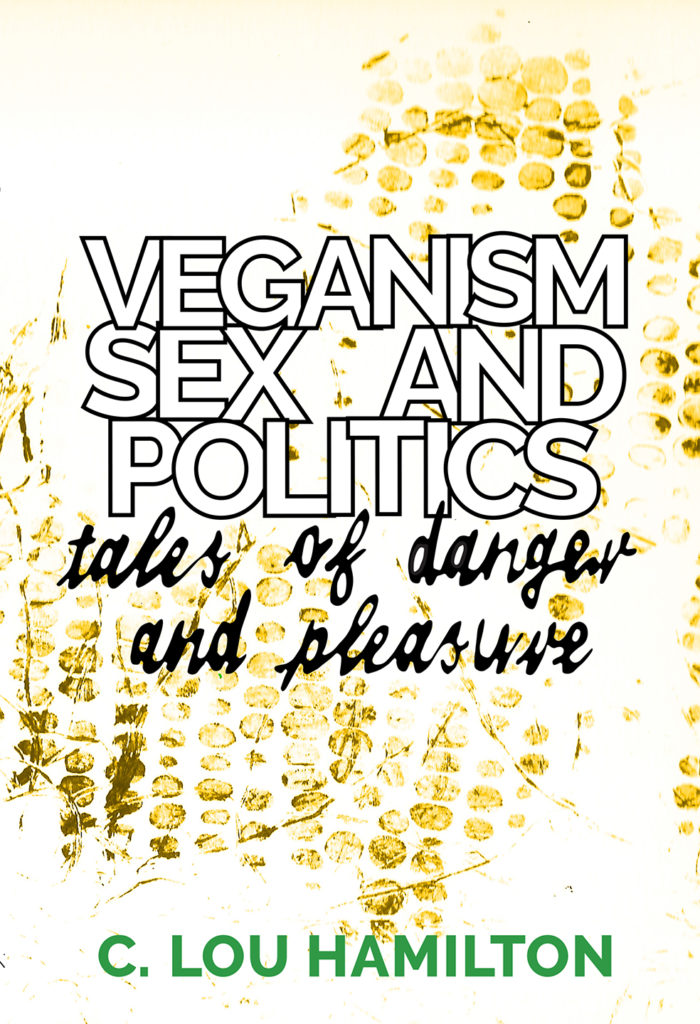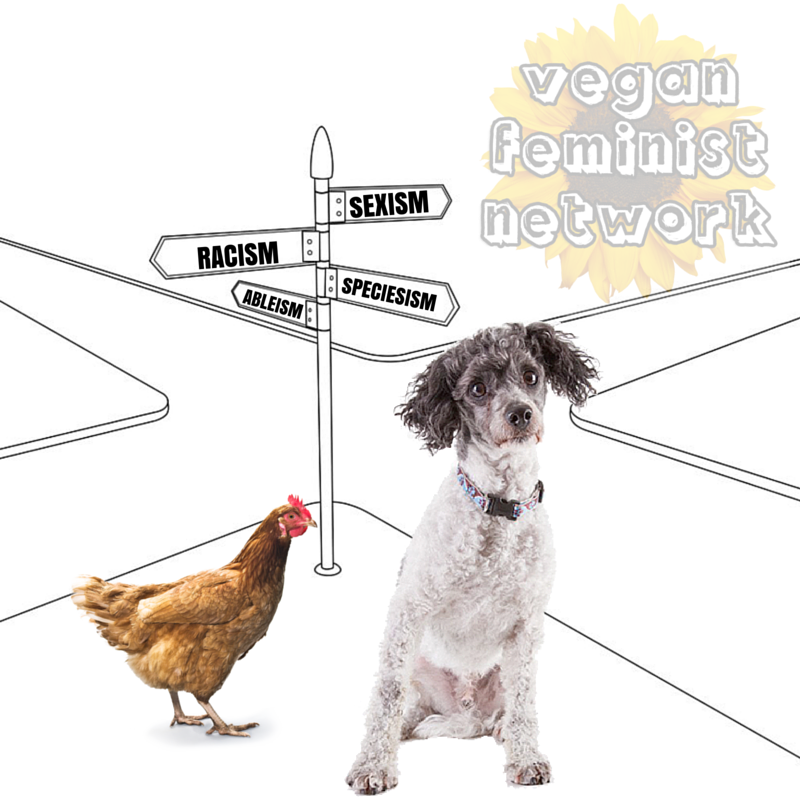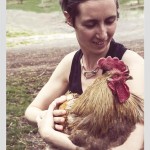C. Lou Hamilton, Veganism Sex and Politics: Tales of Danger and Pleasure. HammerOn Press, 2019.
Hamilton’s Veganism, Sex and Politics offers an approachable feminist spin on modern veganism in the West while tackling the difficult conundrums and compromises sometimes associated with vegan-living in a non-vegan world. The book is aimed at non-vegans who may be sceptical of the white bourgeoisie veganism which is stereotypically depicted in the media, but it also speaks to seasoned vegans who may lack familiarity with critical feminist perspectives as they relate to relationships with food, consumption, and nonhuman animals. To that end, environmental debates, the limits of organic and “humane” production, white-centrism in vegan activism, and the reluctant reliance on speciesism in disabled and queer communities are analysed in Hamilton’s blend of autobiographical musings and theoretical explorations.
At times, however, this critique pays only lip service to leading theory without substantially engaging it. For instance, while Hamilton rehashes the discourse on “dreaded comparisons,” repeating the arguments already well-articulated by Kim Socha (2013), Breeze Harper (2010), and Lee Hall (2010) with regard to resisting the highly problematic tradition in the vegan movement of comparing the institutionalized violence against animals to that which is also imposed on Africans under slavery and Jews under Nazi persecution, Hamilton stops short of extending this critique to the systematic exploitation of women. Hamilton only briefly refers to the work of Carol Adams (2000) with an unsubstantiated suggestion that her “anti-pornography feminism” obscures women’s agency and satisfaction with sex work.
Thus “choice feminism” (the reduction of collective struggle into a buffet of consumer and lifestyle options from which each individual may pick and choose) is introduced to reframe widespread violence against women as either a) blown out of proportion by Adams and her ilk or b) inaccurate given that women “choose” to work in prostitution and pornography. Adams’ theory, furthermore, is described as a disrespectful and clumsy attempt at intersectionality given that women supposedly participate freely in and benefit from Western sexual politics unlike Nonhuman Animals in their respective spaces of oppression. Such a provocative claim would require greater engagement with Adams’ work as well as some scientific evidence, as, firstly, the majority of women (and girls) enter sex work out of economic duress or active pimping and, secondly, sex slavery remains a leading form of bondage globally (Jeffreys 2009). Sex work and sex slavery, for that matter, are the most dangerous fields of “employment” with exceedingly high levels of threat, injury, and death.
Celebrating the agency of a small percentage of persons who enter and remain in the sex industry of their own free will obscures culturally normative misogyny (as well as heterosexism and cis-sexism as LGBT minorities are disproportionately represented in this industry). With regard to vegan politics, choice feminism’s campaign to legalize and normalize prostitution makes for an awkward analogy for other animals. How Hamilton can suggest that institutionalised speciesism should not (or could not) be regulated and reformed to liberate nonhumans while also failing to extend that same logic to women and girls is puzzling and unconvincing. Both sexism and speciesism rely on the pleasurable consumption of feminized and oppressed bodies by the patriarchal dominant class.
Hamilton’s pro-prostitution position likely stems from their commitment to queer politics which, while arguably problematic when used to protect and legitimize male entitlement to feminized bodies, do hold relevance in challenging hetero-patriarchal society’s stigmatization of feminine and queer sexuality and its desire to control bodies deemed “other.” To that end, Hamilton provides and interesting analysis of “fur” and “leather” in the LGBT community. Both products are shaped by class, gender, and colonial relations, making their disruption difficult, but Hamilton suggests a re-envisioning through vegan alternatives which pay homage to nonhuman identities and difference.
Although Hamilton seeks life-affirming species-inclusive alternatives in these cases, their presentation of disability politics is decidedly human-first. In the feminist tradition of challenging androcentric scientific authority, Hamilton encourages those living with disability and illness to become their own experts and engage in speciesism at their own level of comfort. True, the science as an institution has been a source of considerable oppression for marginalized groups and agency over one’s own body and well-being is critical, but Hamilton’s prescription risks fanning scientific distrust to the point of recklessness (particularly in light of the success of the anti-vaccination movement). Further, by encouraging individuals to become their own medical expert and self-experiment with the consumption of other animals, veganism seems to dissipate into a postmodern soup of individual subjectivity and increasing uselessness as a form of political resistance. Given the normative attitudes of cynicism and apathy in the Western vegan movement toward science, Hamilton’s position, while geared toward affirming the individual experience with disability, may be a precarious one.
Hamilton evidently adopts the myth promulgated by professionalized Nonhuman Animal rights organizations that vegans somehow ascribe to an unrealistic level of purity. This strawperson argument, however, lacks validity. In the age of competitive nonprofitization in the social movement arena, the pure vegan stereotype is engaged to legitimize the compromised approaches to animal advocacy (namely, reforming speciesist industries or promoting reducitarianism). These soft tactics are effective for fundraising but run counter to veganism’s political aims of total liberation, thus necessitating some semantical negotiations and vegan stigmatization (Wrenn 2019a). Few, if any, vegans expect faultlessness, and, indeed, The Vegan Society has always, from its founding, emphasized practicality over perfection (Wrenn 2019b). In the case of disability and illness, no one would reasonably expect patients to become martyrs and forgo treatments developed through vivisection or medications containing trace amounts of animal products.
As such, Hamilton’s repeated beleaguering of veganism has the cumulative effect of decentering Nonhuman Animals, particularly in their effort to validate each person’s individual desire, comfort, choice, and ultimately human privilege of determining what counts as “practical.” To this point, it would be useful if Hamilton had extended their analysis beyond feminist theory and applied social movement theory to introduce much-needed evidence-based social science on movement identity politics and effective mobilization. At the very least, more clearly acknowledging how their own take on veganism is far from the widely-embraced or authoritative position would have brought greater credibility and consistency to Veganism, Sex and Politics. Vegan feminism is more of a matter of personal opinion, individual spin, and choice. The celebration of difference, agency, and pleasure-seeking must be matched with a commitment to solidarity, collective struggle, and some degree of sacrifice. Unfortunately, Hamilton’s anthropocentric narrative hesitates on how to effectively negotiate human diversity politics with the interests of other animals.
References
Adams, C. (2000). The sexual politics of meat. New York: Continuum.
Hall, L. (2010). On their own terms: bringing animal-rights philosophy down to earth. Darien: Nectar Bat Press.
Harper, B. (2010). Sistah vegan. Brooklyn: Lantern.
Jeffreys, S. (2009). The industrial vagina: the political economy of the global sex trade. New York: Routledge.
Socha, K. (2013). The ‘dreaded comparisons’ and speciesism: leveling the hierarchy of suffering. In K. Socha and S. Blum (Eds.), Confronting animal exploitation (223-240). Jefferson: McFarland & Company, Inc., Publishers.
Wrenn, C. (2016). A rational approach to animal rights. London: Palgrave.
Wrenn, C. (2019a). Piecemeal protest: Animal rights in the age of nonprofits. Ann Arbor: University of Michigan Press.
Wrenn, C. (2019b). From seed to fruition: a political history of The Vegan Society. Food and foodways 27(3), 190-210.
 Dr. Wrenn is Lecturer of Sociology. She received her Ph.D. in Sociology with Colorado State University in 2016. She received her M.S. in Sociology in 2008 and her B.A. in Political Science in 2005, both from Virginia Tech. She was awarded Exemplary Diversity Scholar, 2016 by the University of Michigan’s National Center for Institutional Diversity. She served as council member with the American Sociological Association’s Animals & Society section (2013-2016) and was elected Chair in 2018. She serves as Book Review Editor to Society & Animals and is a member of the Research Advisory Council of The Vegan Society. She has contributed to the Human-Animal Studies Images and Cinema blogs for the Animals and Society Institute and has been published in several peer-reviewed academic journals including the Journal of Gender Studies, Environmental Values, Feminist Media Studies, Disability & Society, Food, Culture & Society, and Society & Animals. In July 2013, she founded the Vegan Feminist Network, an academic-activist project engaging intersectional social justice praxis. She is the author of A Rational Approach to Animal Rights: Extensions in Abolitionist Theory (Palgrave MacMillan 2016).
Dr. Wrenn is Lecturer of Sociology. She received her Ph.D. in Sociology with Colorado State University in 2016. She received her M.S. in Sociology in 2008 and her B.A. in Political Science in 2005, both from Virginia Tech. She was awarded Exemplary Diversity Scholar, 2016 by the University of Michigan’s National Center for Institutional Diversity. She served as council member with the American Sociological Association’s Animals & Society section (2013-2016) and was elected Chair in 2018. She serves as Book Review Editor to Society & Animals and is a member of the Research Advisory Council of The Vegan Society. She has contributed to the Human-Animal Studies Images and Cinema blogs for the Animals and Society Institute and has been published in several peer-reviewed academic journals including the Journal of Gender Studies, Environmental Values, Feminist Media Studies, Disability & Society, Food, Culture & Society, and Society & Animals. In July 2013, she founded the Vegan Feminist Network, an academic-activist project engaging intersectional social justice praxis. She is the author of A Rational Approach to Animal Rights: Extensions in Abolitionist Theory (Palgrave MacMillan 2016).
Receive research updates straight to your inbox by subscribing to my newsletter.












